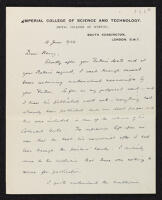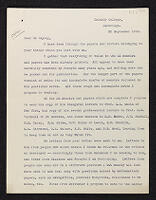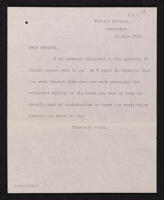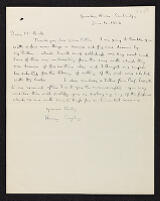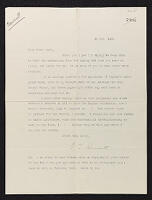These papers consist primarily of writings by E. H. Neville which are accompanied by a small amount of correspondence, and a box of offprints of articles by and about Neville. Some of the writings are identified, but many are not, and it is not clear if the unidentified writings are lecture notes or drafts of one or more books for publication. These unidentified writings tend to be fair copies, with few alterations. Correspondents include W. W. Rouse Ball, W. E. H. Berwick, A. R. [Forsyth?], E. G. Gallop, Amy Herman, R. A. Herman, J. Jackson, J. E. Littlewood (about G. H. Hardy), and W. F. Sheppard.
Sans titreLaregan, France Lynch, Stroud, Glos. - Birthday greetings, a bit late; recommends Professor Denis Saurat's 'Regeneration'; has enjoyed the Frazer memoir; has become a correspondent of Professor Forsyth and Mrs W. H. Young [Grace Chisholm Young], whose husband has lost his memory and is marooned in Lausanne; is glad to hear good news of the Frazers.
It is noted that the Master wishes to sign this memorial; Fellows 'who desire to join in this demonstration' are requested to sign at the bottom and return the sheet no later than 24 February to Sir George Darwin. Two copies; Henry Arthur Hollond, in May 1962, recorded the names on the back of one copy of all those who added their signatures.
Some mathematical calculations on back of sheet.
temporarily at Royal Crescent Hotel, Brighton - Congratulates Frazer.
Imperial College of Science and Technology (Royal College of Science), South Kensington, London, S. W. 7. - Shortly after Cayley's father's death, Forsyth went through his papers at his widow's request; considers that 'everything had already been published save one short paper: and this was included in one of the volumes of his Collected Works'. Understands from personal experience how troublesome the task of dealing with papers can be.
The Copse, Sonning-on-Thames.—The enclosed (3/40) was written with reluctance, as he felt the task ought to have been attempted by someone who knew Forsyth in the nineties.
(Undated. Acknowledged 6 Sept.)
Trinity College, Cambridge. - Has been through Cayley's father's papers gathers that 'everything of value in the MS memoirs and papers has already been printed. All appear to have been carefully examined by Forsyth many years ago, and nothing more can be picked out for publication'. The largest part of the papers 'consist of notes for and incomplete drafts of memoirs included in his published works. All these rough and incomplete notes I propose to destroy'.
Lists proposed recipients of materials. Has no letters himself from Arthur Cayley. Thinks letters from living writers should be either returned to them or destroyed; is therefore returning MacMahon's letters, and destroying those from Glaisher and Forsyth. Of letters from people now dead he proposes to send those from Sylvester to the Master of St John's [R. F. Scott]; thinks most of the rest should be destroyed, though he mentions a few people to whom he would like to send 'a certain number' which he feels would be unproblematic to send. Encloses a few letters and papers 'of a personal character' for Cayley to take care of.
Trinity College, Cambridge. - Is 'somewhat staggered by the quantity of Cayley papers' sent to him; asks if he is right in thinking that Forsyth went through them when preparing the collected edition of Cayley's works, and that his own task is 'chiefly that of distribution to those who would value letters and notes by him'.
Garden House Cambridge. - Is sending Rouse Ball some 'curves and figures drawn by my Father... Some of them are interesting for the care with which they are drawn if for nothing else and I thought one might be selected for the library if nothing of the sort was selected with the books'. Also encloses a letter from Professor Forsyth [now O.6.6/40]; 'you may consider this will justify you in destroying any of the papers which no one will care to keep for sentimental reasons'.
Informs the Master that Margaret Keynes has sent these papers relating to the resignation of A. R. Forsyth to him; has added a note on the 'incident'; he and Broad agree that the papers are worth keeping in the Library.
In response to Forsyth's letter of 28 Apr. 1910 (O.11.a.4/10/20).
With memories of the resignation of A. R. Forsyth.
On embossed notepaper for Emmanuel College, Cambridge. - Would be glad to have the selections from the Cayley papers which Rouse Ball has set aside for him; already has a few specimens of Cayley's autograph work which Forsyth sent him when editing Cayley's collected works, but the papers Rouse Ball has chosen may have an 'intrinsic interest' for him. Has 'never really "gone in for" polyhedra', and doubts whether he deserves to have the Taylor collection, but would like to inspect it; wonders whether Hobson was right to decline it for the School [of Mathematics?]; polyhedra 'have now rather an extra importance, with the mathematical crystallography so much to the fore'; asks when and where he may see the models.
Examines Elizabeth Wells Gallup's biliteral cipher theory, which she claimed was proof of Bacon's authorship of the works of Shakespeare.

